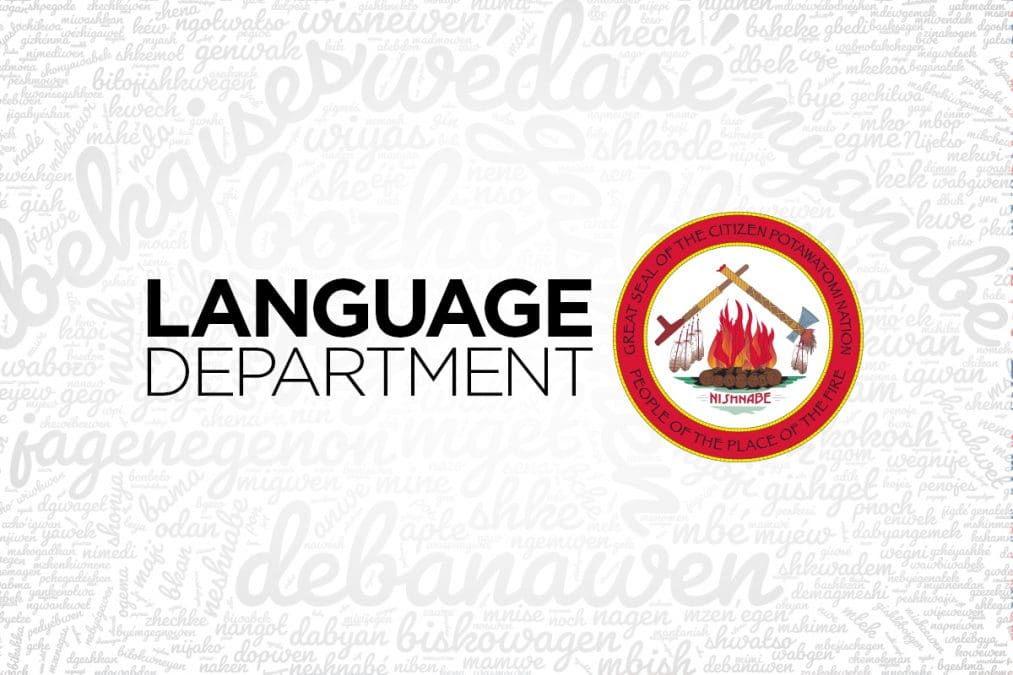The Citizen Potawatomi Nation Language Department has expanded its reach for the 2020-21 school year, increasing from two to four schools. The program now serves more than 40 students between ninth and 12th grade. Wanette, Shawnee, Maud and Tecumseh Public Schools now offer the Nation’s course as a world language credit.
Some schools in rural Oklahoma offer no world language instruction and meet the graduation requirement in other ways. CPN’s interactive digital platform fills a gap in students’ education.
“It’s something that we can offer anywhere in Oklahoma because of the way that the course has been set up and the way we created it — self-paced. It’s not necessarily a live class, and it has videos and things and tests and quizzes. It’s all built inside of this self-contained component. … They could offer it as many times as they want a day,” said Language Department Director Justin Neely.
The course requires computer access, an internet connection and an adult to monitor class demeanor and progress; however, offering it is free. Last year, the Oklahoma State Board of Education certified the curriculum for the next five years. Neely attributes part of the increase in registration to a need for homeschooling and virtual options due to the coronavirus pandemic.
“If you’re going to find a positive out of a negative out of the COVID situation, I would say that COVID has definitely pushed schools in more of a digital direction,” Neely said. “And I think it’s definitely opened their eyes up to the possibility like, ‘Hey, we may have to go digital.’ Well, this course here is perfect.”

Keeping culture alive
At Shawnee Public Schools, Indigenous students from several tribes enrolled the class, including the Citizen Potawatomi and Sac and Fox nations and the Hopi Tribe.
“For Native students, in particular, I think it’s nice to have an alternative — not to have to take, in a way, colonial language. These languages that were colonial powers that in a lot of ways oppressed Native people early on, whether it be French or Spanish or whatever,” Neely said.
The language department tries to reach Tribal members of all ages. While they teach children at the CPN Child Development Center and after school program, the course provides high school students a foundation and motivation to stay connected to the culture while becoming an adult.
“It’s a doorway to show what was important to our ancestors and what continues to be important to us today,” Neely said. “And it has all these deeper meanings and understandings inside the language about the culture and about how we see the world as Potawatomi people. The language definitely changes the way you see things.”
Reaching non-Natives
While his oldest daughter is one of 12 students enrolled in the program at Shawnee High School, Neely also enjoys offering the course to every school in Oklahoma.
“Obviously, I want all children to be able to benefit and all Potawatomi or non-Potawatomi, whoever wants to take the course. I want it available and out there,” Neely said.
The high school course presents an opportunity to build a rapport with younger residents, especially non-Natives.
“These are people that live in the areas around Oklahoma that have interactions with our Tribal members, that have interactions with our Tribe, that may even have a new respect for our Tribe as a whole because of their understanding of who we are and where we’re coming from and a little bit of our language,” Neely said.
While this year’s enrollment has more than doubled, he strives to continue to increase student involvement. While the Oklahoma Board of Education approved the course, offering it at a local level requires additional authorization from superintendents and school boards. Many districts do not know Potawatomi is an option, and Neely encourages parents and the community to help bridge the divide.
“If you have a student that goes to school in Oklahoma, be that advocate in your community,” he said. “Reach out to your principal. Reach out to your superintendents. Say, ‘Hey, I want my kid to be able to take Potawatomi.’”
For more information, visit potawatomi.org/language or email Justin Neely at jneely@potawatomi.org.
